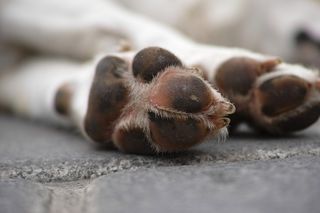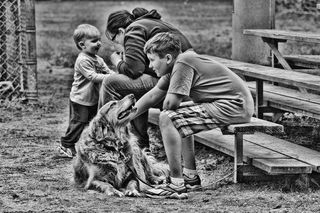Grief
4 Reasons Why Pet Loss Matters to the Helping Professional
Professionals should familiarize themselves with the intricacy of pet loss.
Posted June 6, 2017 Reviewed by Ekua Hagan

Whether you're a licensed professional counselor, psychologist, marriage and family therapist, social worker, or other professional that serves others, such as nursing and care workers, pet loss matters. Knowing that pet loss is a profound and realistic point of grief for many animal lovers and pet parents is important to adequately serve the needs of our clients, patients, and residents.
The American culture has an underlying fear of death and dying. It's an uncomfortable topic for many, professionals alike. Although it certainly makes sense that unless one has spent time truly processing through their own fears, beliefs, and judgments about death, facing one's mortality could be a scary prospect.
Stanford School of Medicine launched a study in which they tallied the wishes of respondents to die at home. The study found that a majority of respondents, 80% expressed their wish to die at home. The study additionally highlights, however, that in America, 60% of us die in hospitals, 20% pass in skilled nursing homes, and a measly 20% die at home surrounded by loved ones. We have a misunderstanding about death and when asked, most will say they hope to die peacefully in their sleep overnight.
Pet lovers all recognize that the time with their furry friend can be limited, but just as we have many misconceptions about human death, we have them about the death of our pets. This post begins a series in exploring why exactly pet loss matters for the professional. It will highlight overall themes and approaches to supporting the people, families, and systems we serve in an empirical way, allowing counselors to deliver effective, culturally sensitive, and responsible support to those facing difficult decisions with their four-legged friend.
Reason 1: Professionals are critical for normalizing a stigmatized grief experience.

There's a lot of cultural stigma that comes from experiencing, and subsequently grieving, the death of a pet. Professionals can help individuals and families understand where this grief is coming from. They can also normalize the grief experience if they present an understanding of where it comes from.
Many times the concept of death is smoothed over by parents telling children their pet "went to sleep" or friends who share well-intended words like, "it was just a pet, you can always get another one." As a result, we have a culture of children afraid to sleep and night and wishing their pet would come back, and others that feel conflicted about the amount of grief they feel, questioning if they are going crazy.
Reason 2: Not all grief is the same.
Grief never presents itself "within a box," meaning, even if we know there is an upcoming physical death and prepare with anticipatory grieving, everyone grieves in their own unique way. Take a nuclear family, for example. Each parent will be grieving differently, and each child presents with their own manifestation, and subsequently coping ability to process their emotional experience.
Not only does grief impact us, but the fact that it is a pet will also impact us. Complications arise with a traumatic grief experience of our pet, or if we are facing an incomplete loss through a pet running away.
Reason 3: Euthanasia decision-making has an impact on the psyche.

A lot of complicated emotions arise when having to make a choice as difficult as euthanasia. Pet owners must make extremely difficult decision(s) when it comes to euthanasia and assessing their pet's quality of life.
Pet owners find themselves facing extreme amounts of guilt and possible shame for what they are experiencing. Most pet owners find themselves facing sleep disturbances and may find it difficult to continue the tasks required for meeting basic needs and engaging in self-care.
Professionals can help the people that they serve to navigate through the complex structure of emotions that families and individuals face during difficult times. Professionals can also provide guidance on maintaining basic needs and processing the guilt experience in a healthy, constructive way.
Reason 4: Understanding attachment and the positive role of animals within the life cycle.
Key to understanding many areas of our life is our level of attachment. Whether we have unhealthy or healthy attachments, pet owners will be impacted in a significant way when faced with the death of a pet. Children, for example, typically experience the death of a pet or small animal as one of their first experiences of loss. If handled properly, a loss experience can build children's resilience and impact their worldview of death, promoting a reduction of fear and stigma that are so typically associated.
Pets are immensely beneficial supports that build an empathetic connection and bond throughout the human life cycle. Individuals who struggle with social isolation, coping methods, and mental health concerns can all benefit from the positive relationship built between themselves and their pets.
Unfortunately, many such individuals and family systems do not prepare ahead of time for a loss experience and can be left feeling completely devastated should their pet suddenly fall ill, or in the case of a traumatic loss. Professionals can begin to teach and understand anticipatory grief and the importance of making plans in case of such events.




